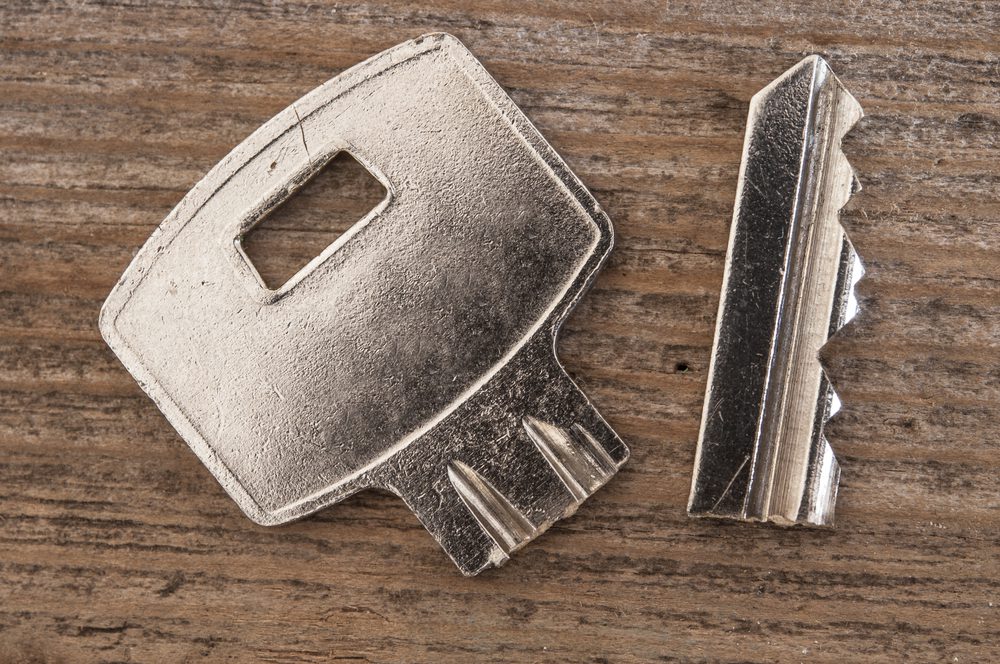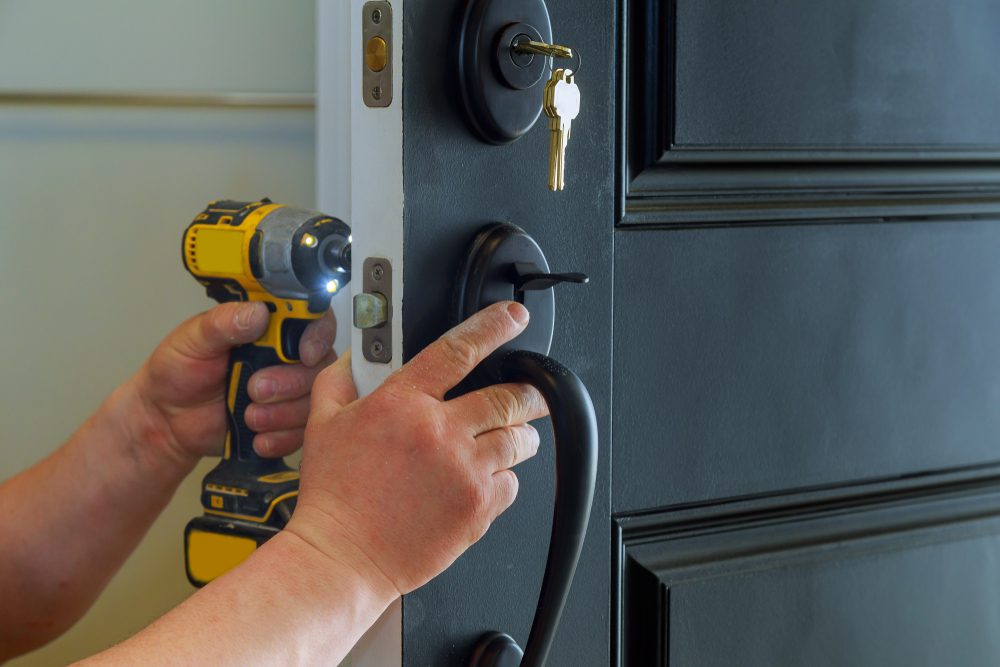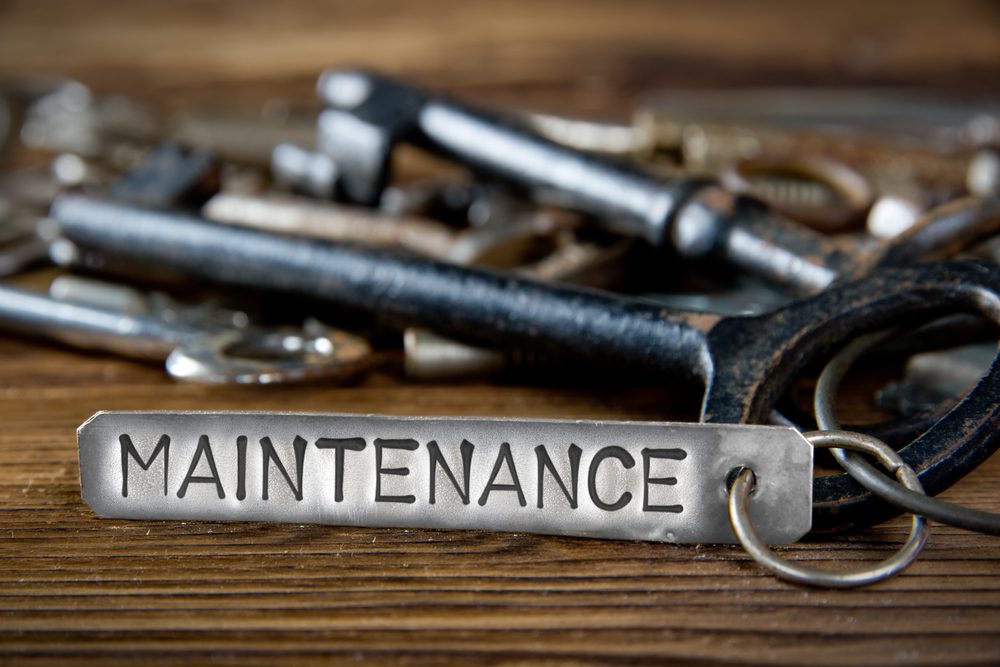Most of us probably think of major issues such as broken boilers and appliances or leaking roofs, but even the smallest things can cause difficulties. Something as seemingly innocuous as locks and keys can create practical problems as well as uncertainty over responsibility and liability. So what do you do when keys break in the lock?
Imagine the scene
The tenant returns home, puts the key in the lock as usual and turns it, but instead of the door opening, the key snaps off, leaving a section jammed in the lock and stranding the tenant outside.
The likelihood of the tenant being able to retrieve the broken piece is slim and even if they can, there’s still no way of getting in. So what can they and the landlord do?
The most common type of key lock in the UK, especially in rented properties, is the latch lock. These are so widely used that they have become colloquially known as Yale locks, after the most popular brand.
They are surface-mounted on the door, unlike mortice locks, and they enable the door to be opened simply with the key, without the need to turn a separate handle.
The latch element operates from the inside, allowing the occupant to close the door without engaging the lock, which is useful if they need to go in and out quickly. It does also mean that if the key breaks, the lock becomes inoperable.
Provided that the key has been obtained from a professional key-cutting service it should be robust enough to do the job. Cheaply produced copies may use inferior materials and won’t be as resilient.
However, assuming the landlord or tenant has taken the trouble to get a strong, properly sourced key, it should last for years or even decades.
Why would a key break in the lock?

The wrong key could have been used by mistake, and if forced, could potentially damage the lock too.
If you have the correct key, then factors such as wear and tear as well as poor maintenance could be the cause.
If a key has already been weakened by frequent use, then it can snap if too much pressure is exerted trying to gain entry. The fault may lie in the lock itself, which has grown stiff through lack of lubrication or climatic conditions.
If the key has become misshapen or bent, then not only will this create a weakness, but it also means it can’t turn smoothly and is more likely to break, even in normal use.
In most cases, if it is entirely accidental and results from natural deterioration, it is the landlord’s responsibility to fix it.
However, if the lock and key are fairly new, there’s a chance that the tenant has been negligent or heavy-handed when inserting and turning the key. In this case, it can be persuasively argued that the tenant should be liable for the cost of repairs.
What will a repair or replacement cost?

In terms of cost, much depends on the extent of the damage. A locksmith has the tools and skill to extract the broken section from the lock and maybe even cut a replacement from the pieces if it’s not possible to get hold of the landlord’s spare immediately.
Making the copy is not the expensive part – it’s the locksmith’s callout charge which will inflate the bill. Depending on the time of day, this could be anything from £65 to well over £100 defending on where the property is located.
If the lock has been damaged in the incident, then costs will rise to cover repair or most probably, replacement. The price of a new lock is about £100 to which you need to add the locksmith’s charge for labour. This could run to another £150.
What do you do when keys break in the lock?
First of all don’t panic! Assess the situation.
Whether you are the tenant, clerk or indeed the landlord a cool head is definitely called for.
As the tenant – if the key is broken and still in the lock – call the landlord and explain the situation. Many seasoned landlords may be able to sort this themselves as many will replace locks at check out so ask first before you call a locksmith as this could save you £’s.
As the landlord – if you are not able to retrieve the key or have spares – call a qualified locksmith.
As the inventory clerk – if the key is clearly broken and cannot be retrieved, call the person or agency that commissioned your services.
Explain the situation including any issues potential around time constraints for example a tenant is due to move in shortly. This helps the agent or landlord to understand whether an emergency call is needed or the matter can be dealt with later.
Usually clerks would not have to pay for the breakage however if, as the clerk, you have left the keys in the kitchen worktop and exited the house that has a self locking door, then you might be liable for the call out charge so keep keys on your person at all times!
Prevention is always better than cure

Maintenance issues are occupational hazards for landlords. In an ideal world, both keys and locks will be checked as part of routine maintenance so that the chance of this costly inconvenience can be minimised.
It’s well worth asking tenants to keep an eye on the condition of their keys, but if the worst happens, it’s useful to know where the liability lies and have a good locksmith on your maintenance list of service providers.
Accidents can and do happen, so it’s always better to be prepared by having a trusted locksmith’s number at hand should this ever happen.
At Inventory Base, we work closely with landlords, and inventory clerks to promote good practice and ensure everyone helps each other to manage the safety of the property with detailed reports, instant messaging and intuitive workflows that include actions to help manage maintenance works and apportion liability fairly.
To find a qualified, insured locksmith try searching on Google, use Check-a-Trade or contact Master Locksmiths Association (MLA).

